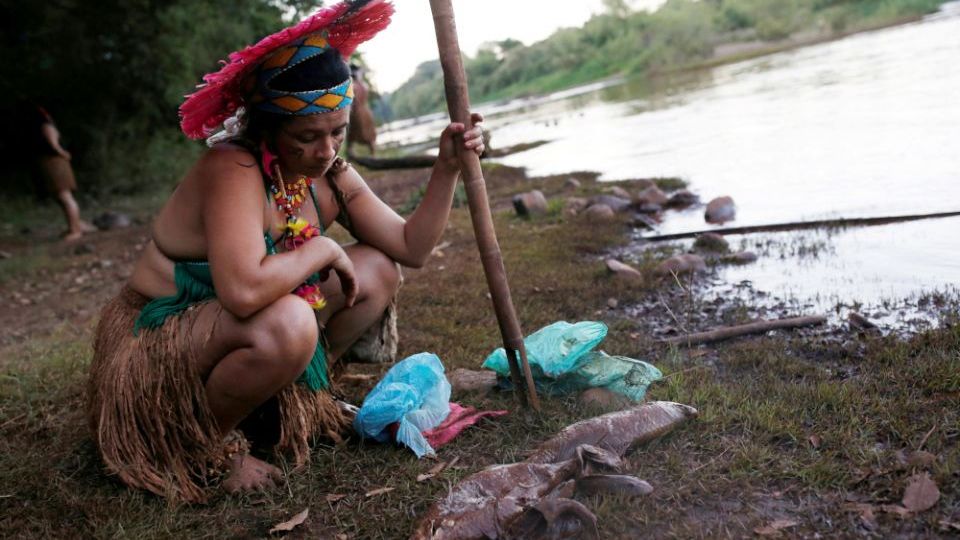
SAO PAULO — The Brazilian bishops’ conference has established a commission to assist dioceses and prelatures in areas where mining operations are harming communities and the environment.
Meeting since December, the Special Commission on Mining and Integral Ecology is preparing to address Brazilian President Jair Bolsonaro’s plan to allow mining and other development projects on indigenous lands and elsewhere.
Studies have shown that indigenous and other traditional peoples are among the groups most vulnerable to widespread mining operations.
“About 25% of the indigenous lands and other reservations in the Amazon have been already registered by several mining companies” for extraction, Fr. Dario Bossi, a commission member, told Catholic News Service.
The commission emerged from a working group established by the bishops in 2017 to study the consequences of hydraulic fracturing for natural gas and oil and to map the rising number of communities impacted by extractive industries.
At the time, Brazil was continuing to recover from the aftermath of the November 2015 collapse of the Mariana dam, which caused millions of gallons of toxic fluid and mine tailings to spill into rivers and nearby communities. The collapse killed 19 people and devastated a large territory.
The working group, led by Bishop Sebastiao Lima Duarte of Caxias do Maranhao, organized meetings among bishops and community residents to document conflicts with mining operations. The encounters led to a theological-pastoral reflection that was presented during the Synod of Bishops for the Amazon.
As the meetings continued, a second tailings dam collapsed in January 2019 in Brumadinho, causing more than 250 deaths.
“The crimes of Mariana and Brumadinho … are a tragic confirmation of the structural violence which is intrinsic to this model,” Bossi said.
The commission’s initial research demonstrated that conflicts between mining ventures and communities exist in at least 60 locales and that persecution of activists who oppose extractive operations was increasing.
“Brazil has always had an economy strongly based on extractivism,” Bossi explained. “The current mining model allows a reckless and usually irresponsible organization of extractivist activities. There are numerous tailings dams in critical situation in the country, with serious risks of collapse.”
In Minas Gerais state, where Mariana and Brumadinho are located, government authorities said there are more than 400 tailings dams, and 10% of them are at risk of collapse.
Vale SA, Brazil’s largest mining company, said it does not operate mines on indigenous lands. The company said it regularly communicates with communities near its mining operations.
Such dialogue supports “structuring actions” that contribute to the “ethnodevelopment” of local groups, the company said in an email to CNS.
Since the Brumadinho collapse, the company said, Vale decided to decommission nine similar tailings dams and created a monitoring center to oversee 111 dams. The company noted it plans to spend nearly $2 billion on a new tailings disposal system that eventually will replace the dams.
Meanwhile, a Minas Gerais state judge accepted charges Feb. 14 against Vale SA’s former Chief Executive Fabio Schvartsman and 15 others in connection with the Brumadinho dam collapse.
The judge’s decision follows a filing by state prosecutors in January accusing the officials of homicide. Prosecutors allege that Vale and a German inspection firm, TUV SUD, intentionally hid information about safety issues at tailings dams for years.
Despite the disasters, the church commission on mining does not oppose every kind of mineral exploitation, Bossi said, but considers the “current rates of extraction” to be “unsustainable” and that they constitute a violation of “human and environmental rights.”
Citing Pope Francis’ encyclical “Laudato Si’, on Care for Our Common Home,” and the understanding that social and environmental rights are connected, Bossi said the commission advocates for the protection of traditional peoples. The commission, he said, believes local communities should always be consulted before any mining project begins.
“We also believe in the possibility of alternative models of development, with a transition from predatory mineral extraction to an essential one,” the priest said.

















